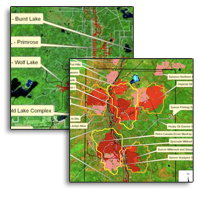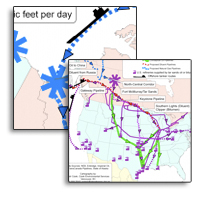Tar Sands 101
The Tar Sands "Gigaproject" is the largest industrial project in human history and likely also the most destructive. The tar sands mining procedure releases at least three times the CO2 emissions as regular oil production and is slated to become the single largest industrial contributor in North America to Climate Change.
The tar sands are already slated to be the cause of up to the second fastest rate of deforestation on the planet behind the Amazon Rainforest Basin. Currently approved projects will see 3 million barrels of tar sands mock crude produced daily by 2018; for each barrel of oil up to as high as five barrels of water are used.
Human health in many communities has seriously taken a turn for the worse with many causes alleged to be from tar sands production. Tar sands production has led to many serious social issues throughout Alberta, from housing crises to the vast expansion of temporary foreign worker programs that racialize and exploit so-called non-citizens. Infrastructure from pipelines to refineries to super tanker oil traffic on the seas crosses the continent in all directions to allthree major oceans and the Gulf of Mexico.
The mock oil produced primarily is consumed in the United States and helps to subsidize continued wars of aggression against other oil producing nations such as Iraq, Venezuela and Iran.
To understand the tar sands in more depth, continue to our Tar Sands 101 reading list
World will struggle to meet oil demand
by Carola Hoyos and Javier Blas in London
Financial Times FT.com (October 28 2008)
Output from the world's oilfields is declining faster than previously
thought, the first authoritative public study of the biggest fields shows.
Without extra investment to raise production, the natural annual rate of
output decline is 9.1 per cent, the International Energy Agency says in
its annual report, the World Energy Outlook, a draft of which has been
obtained by the Financial Times.
The findings suggest the world will struggle to produce enough oil to
Deputy Premier of Alberta aims to increase trade with Middle East, esp Israel
Deputy Premier aims to increase trade with Middle East
Edmonton... Alberta Deputy Premier and Minister of International and Intergovernmental Relations Ron Stevens will support a delegation of 30 Alberta companies to the Abu Dhabi International Petroleum Exhibition and Conference (ADIPEC), the largest oil and gas conference in the Middle East.
The four-day conference brings together more than 1,800 exhibitors from around the world, featuring 200 international speakers and is one of the highlights of the Oct. 30 to Nov. 14 mission.
World is facing a natural resources crisis worse than financial crunch
The Guardian October 29, 2008
Biocapacity
World is facing a natural resources crisis worse than financial crunch
Two planets need by 2030 at this rate, warns report
Humans using 30% more resources than sustainable
Juliette Jowit
The world is heading for an "ecological credit crunch" far worse than
the current financial crisis because humans are over-using the natural
resources of the planet, an international study warns today.
The Living Planet report calculates that humans are using 30% more
Abuse of Temporary Foreign Workers underlies labour dispute
Maple Leaf poultry plant plucks more than chickens
Abuse of Temporary Foreign Workers underlies labour dispute
EDMONTON, Oct. 7 /CNW/ - Maple Leaf Foods' misuse of the temporary
foreign worker (TFW) program is an attempt to maintain an artificially low
wage in their poultry plant according to the United Food and Commercial
Workers Local 1118 and is a key element in the ongoing strike at the plant.
"Canadians were assured by the government that TFWs would always be paid
fair market wages and promised that employers like Maple Leaf would not be
Energy, Mining Stocks Collapse on Late Day TSX Selloff
Late-day selloff sinks TSX
STEVE LADURANTAYE
Globe and Mail Update
October 27, 2008
A late-day selloff in financial, energy and mining stocks pushed the S&P/TSX to a deep loss Monday, even as commodities recovered from earlier losses.
The S&P/TSX tumbled 8.1 per cent, or 756.75 points, to 8,537.34 points, its lowest close in four years. Manulife Financial, which may need to raise capital to appease regulators, led the downward charge with a loss of 15.3 per cent.
Olympic resistance conference media
VANCOUVER, B.C. — Activists met in Vancouver Sunday to talk strategy around
resisting the 2010 Winter Olympic Games.
While opposition to the Games has been steady since before Vancouver won
them in 2003, protests are usually connected to a single of the many issues
around them.
But dozens gathered at the one-day conference to focus on converging
Canada's diverse activist community under one banner for the Games.
"It's important to use to connect with each other," said conference
participant Phillipa Ryan.
"Our humanity needs to be respected."
CBI Partner Nexen Pats Self on the Back with Greenwash Paint
Keep in mind: Nexen waste burning "co-generation" will create up to EIGHT TIMES the C02 and other greenhouse gas emissions footprint of a regular pump jack.
--M
Long Lake partners praised for efforts
Calgary Herald
October 26, 2008
All but 10 per cent of the water is to be recycled. The project will have ponds, but not giant tailings ponds like those at mining projects such as Syncrude Canada, Suncor Energy and Shell's Athabasca Oil Sands Project.
Quick Sand: Credit Crunch and Falling Oil Hit Tar-Sands Projects
Quick Sand: Credit Crunch and Falling Oil Hit Oil-Sands Projects
October 24, 2008, Wall Street Journal
Posted by Keith Johnson
From Canada, more signs that the oil industry is starting to feel pinched.
Two big Canadian oil-sands producers are delaying oil-production projects and scaling back capital expenditure. Suncor and Petro-Canada both pushed back plans to install “upgraders” that can turn tar sands into crude oil.
Canada tar sands slowdown may halt runaway costs
Canada oil sands slowdown may halt runaway costs
10.24.08
Canada - By Jeffrey Jones
CALGARY, Alberta (Reuters) - A slowdown in spending on multibillion-dollar projects to develop Canada's oil sands, one of the world's largest deposits of crude, should help cure one ailment the industry has so far been unable to shake: runaway inflation.
Enbridge weighs stake for aboriginals (Gateway Pipeline)
Enbridge weighs stake for aboriginals
From Herald News Services
Published: Saturday, October 25, 2008
Enbridge Inc. is considering offering aboriginal groups an equity stake in its planned 525,000-barrel-a-day Northern Gateway oilsands export pipeline in order to secure support for the project, a company official said Friday.
Enbridge, Canada's No. 2 pipeline company, is still working out details of how large a stake it would offer to native communities along the pipeline's route. As well, it has to firm up how any such stake would be financed.



